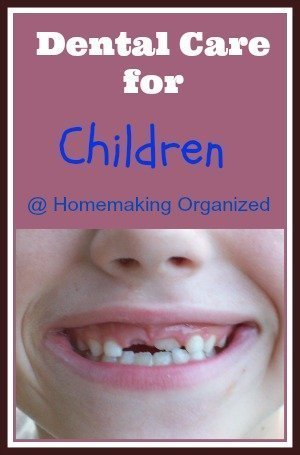Start Dental Care at an Early Age
 Dentists recommend adults stop by for a check-up twice a year. But what about kids?
Dentists recommend adults stop by for a check-up twice a year. But what about kids?
Even though kids start out with no teeth and end up losing the first teeth they start with, dental care is still very important for children.
When we were foster parents it was one of those boxes you had to check off. The children we cared for had to start seeing the dentist as soon as their baby teeth came in.
When we adopted our own daughter it has already been part of our pattern so she saw her first dentist at age two.
Now at age 8 she has her own annual visit with our family dentist and having acclimated her to the dentist chair early on made it easier on her when she had to have some difficult baby teeth pulled this summer.
The idea is that laying a solid foundation of dental care early on can prevent cavities, acid erosion, tooth decay, gum disease and a whole host of problems that can result from all that stuff, such as cardiovascular disease. (Did you know that?)
A clean and healthy mouth can give a child a confident smile and lead to more confidence throughout life.
Here are some facts about dental care to keep in mind.
The center for Pediatric Dentistry says early dental care is important because more than 40% of children have tooth decay before kindergarten.
* Early check-ups prevent cavities and tooth decay.
* With healthy teeth, children learn to chew easily, speak clearly and smile with confidence.
* Proper cleansing can remove bacteria in the mouth which can lead to other diseases.
Here are some tips for dental care at various ages:
Birth-1
- As a baby make it a habit to wipe your baby’s gums with a washcloth to clear bacteria from gums. Do this daily as you would brushing teeth.
- When your baby’s first tooth arrives, gently begin to brush the tooth daily with an infant infant toothbrushtoothbrush.
- Dentists recommend that only breast milk, milk or formula go in the baby’s bottle. No juice or sugar water or pop.
- Avoid letting your baby sleep with a bottle in its mouth. As your baby sleeps the milk and juice swimming in their mouths contain sugars that cause tooth decay.
- As your child begins to get teeth keep up the brushing with an infant toothbrush and a tiny dab of baby toothpaste.
Age 1-2
- Dentists recommend parents teach children to drink from a cup as early as the age of one and avoid prolonged reliance on sippy cups.
- Consider scheduling the first dentist visit between age 1-2. Although your child may not have all his or her teeth yet, the dentist will examine your child’s mouth and talk about what to expect in the next year. For many young children, this first visit will be the start of a positive experience at the dentist and begin a solid foundation of dental health care throughout their life.
Age 2-6
- Your toddler will be able to brush her own teeth with supervision and spit the toothpaste out. Some experts recommend continuing to brush their teeth for them until the age of six (but I would tack on until 10!).
- Many recommend that children brush as long as “Old McDonald” or the ABC song so that they know they’re spending enough time.
- Monitor your child’s intake of sugary foods and drinks.
Starting your child out with healthy dental habits will begin a pattern of healthy habits for life. If you can start your child out with healthy habits from the start, she will develop the habit of brushing and flossing daily.
Early positive experiences with the dentist’s office will make those twice-yearly visits easy and part of your routine. Make it a time to look forward to. Enjoy an outing afterwards. Beginning from an early age with healthy dental habits can help prevent disease, give your child a foundation of healthy habits, a confident smile, strong teeth and healthy gums that will last a lifetime.


One Comment